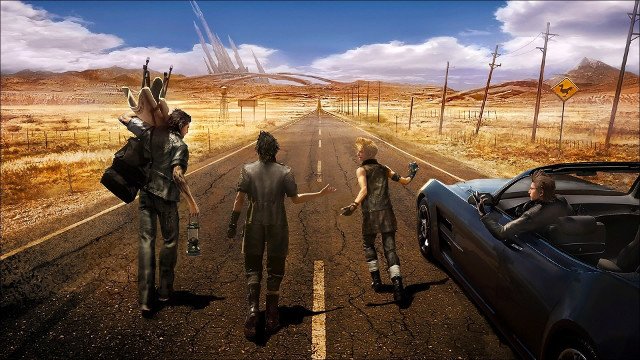Hajime Tabata directed Final Fantasy XV, Crisis Core: Final Fantasy VII, and Final Fantasy Type-0. I sat down with the man himself in Tokyo to talk about FFXV, his exciting mystery project, smartphones, the Final Fantasy series itself, and whether humans are gradually becoming robots. Here’s a transcription of our conversation.
Hajime Tabata: Hey did you read this story online that says I’m bringing Final Fantasy XV to Switch, using Unreal Engine?
GameRevolution: No, I didn’t. Is that true?
Tabata: No.
GR: Can the Switch even run Final Fantasy XV?
Tabata: No, it can’t.
GR: Final Fantasy XV is multiplayer now. I didn’t expect that. Did the team?
Tabata: Not from the start, no. We had an idea that it might be nice, but, no….
We decided just after we released or just before, I can’t remember exactly, but it was around that time. Then we split the team up into various other teams, like for DLC and expanding the game and so on. And then we decided, yeah, we’re going to try and make this a reality; we’re going to try to do multiplayer.
GR: When exactly was that decision made?
Tabata: Between autumn and winter of last year. Development started after the release of the main game. Planning stages started a little bit more.
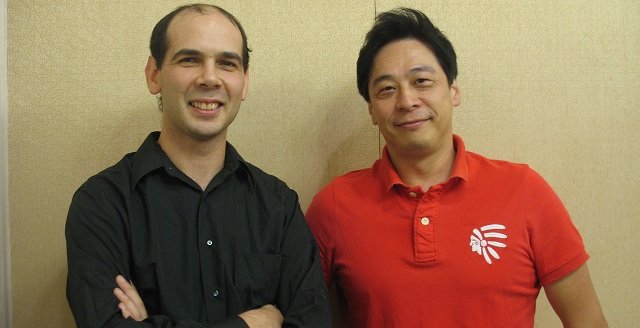
GR: The hot new phrase being kicked around the industry, including at TGS, is “games as a service.” FFXV is getting a steam of updates not seen before in the series, so is that the future of Final Fantasy, do you think?
Tabata: A lot of people are going on about that?
GR: Yeah. At [TGS keynote speeches], even if the speeches were in Japanese, they’d say “games as a service” in English.
Tabata: But if you mean, do I think Final Fantasy is always going to carry on with the games as a service model? I don’t think it always will. It doesn’t have to be, no. We thought it would be good for Final Fantasy XV, so we used it for XV, but it doesn’t follow, otherwise.
The reason for that is we wanted our interaction with the fans to be not just one point in time but sort of a line extending out. If you look at traditional game development, you can get feedback during the process and digest that. After release, you get reactions and responses. If you use the traditional development model, that’s the end of that.
But with the service model… you can essentially continue to develop the game alongside the fans. We really wanted to try that, so we decided to do it with XV.
GR: Did the popularity of FFXIV factor into the decision to go with multiplayer and games as a service?
Tabata: Not really. There is some overlap, but the audiences for XIV and XV are largely different things. They’re still quite different. Plus, we kept people waiting a pretty long time for XV, right?
GR: Well, kind of….
Tabata: There were obviously people who would have known about XV and picked it up regardless of when it released, but also some people who’d been waiting a really long time; so we wanted to serve those fans for quite some time.
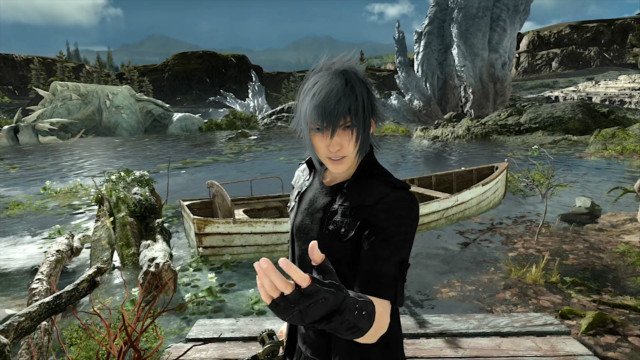
GR: You talk about waiting for a long time, I assume you’re including when it was supposedly, technically called “Final Fantasy Versus XIII” then?
Tabata: Of course, yes.
GR: But about how much of that actually carried over into FFXV?
Tabata: Hard to say. Versus XIII was never a complete game, so you can’t really measure it. The things I really wanted to carry over were characters and world it was set in.
The technical base for the two games was very different. Rather than say, “How can we convert what we have of Versus XIII into XV,” and what was important was keeping the stuff we really wanted to keep from Versus and reassessing it as what would work and what has to be there for it to be a proper numbered Final Fantasy game.
If [Square Enix] came to me and said “FFXVI is your next important mission,” I would do it and I’d put me all into it.
GR: So with Versus XIII to XV, you came in and picked up a project that was underway, Crisis Core: Final Fantasy VII was a prequel, Type-0 was originally Agito XIII (part of the Fabula Nova Crystallis group). Would you like to direct a Final Fantasy that starts from scratch? With you as the director from the beginning?
Tabata: It’s half and half really, certainly not in a negative way. Crisis Core and FFXV had some back story behind them, some things down. There’s not much difference between that and something completely new. It’s not all that different, really.
Certainly, the way that games are judged is by how many people liked it or not, so I can’t say it wouldn’t be nice to create something that has 100% my stamp on it. I think the way my whole team looks at it is, the most important thing is making that game that goes out and makes as many people happy as possible.
[So, that being said], rather than continue Final Fantasy, what my team wants to do is start up a completely new project. That’s what we want to do at the moment?
GR: Would you take Final Fantasy XVI if [Square Enix] offered it to you?
Tabata: If the company came to me and said “This is your next important mission,” I would do it and I’d put my all into it. But what I want to do and what my team wants to do is create something new, and that’s what we’re going to do.
From doing Final Fantasy XV, we got so much experience and know-how, we really want to be using it to make something with a clean slate. From the company’s perspective, it’s come together that I think they want us to do that.
GR: So you’d prefer to start a new project, but how busy are you with Final Fantasy XV DLC and things? When would a new project start?
Tabata: It’s already started.
GR: Really?
Tabata: Yes.
GR: What can you tell me about it?
Tabata: Well of course I can’t tell you anything right now.
*Everyone laughs except Square Enix USA PR, whose pulse I assume has gone way above 200bpm*
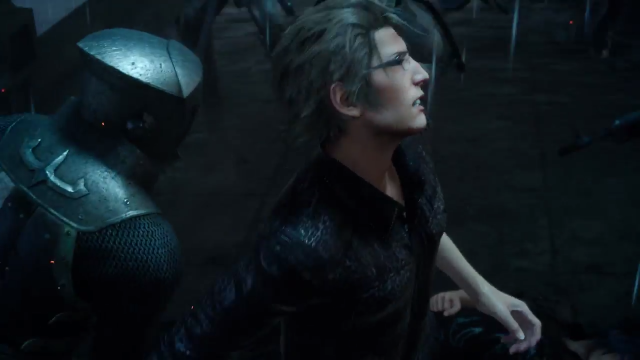
Tabata: FFXV is important, so it’s obvious that it takes up some of my time. The plan we had for FFXV DLC ran up till the end of this year. We didn’t have a plan for next year.
But now, we’ve extended that. We’re gonna carry on with that service model, FFXV will continue on to the end of next year.
GR: You mean with new DLC?
Tabata: More new DLC and things that tie in to story of the main game, too. It’ll be stuff that helps satisfy and excite fans.
When we start really releasing information about this new project… that will be quite a ways down the line.
There’s no one in the company that thinks we can just make a game, stick a chocobo in it and call it Final Fantasy.
GR: Some people say that “Final Fantasy” has just come to mean “any Square Enix RPG with a high budget,” like they didn’t know what else to call it, so someone can stick a Chocobo in there and call it Final Fantasy. Not my words, but I’ve seen it on the internet more than a few times. What do you say to that notion?
Tabata: It’s always been part of the series DNA that it always changes. Having recent FFs be different from the earlier ones isn’t a bad thing, it’s part of the natural evolution of the series.
And I think one reason that the series has carried on as long as it has is that each team values certain core things. If there’s something the team looks at and says “That’s not Final Fantasy. It just isn’t,” then it won’t be in [a Final Fantasy game].
Some individuals of course… I mean it might vary from person to person a little bit, what defines Final Fantasy, but from my own point of view, what makes Final Fantasy what it is, is always pushing the boat on technology — always using the latest technology. Always challenging ourselves to see the future, [see] what games are gonna be about in the future and kinda go for that now. Those are some things that I think make Final Fantasy what it is.
And with a franchise that’s gone on as long as Final Fantasy, everyone has the one they say is the best. There are people who love VI and VII, but many people who love all those games. When a new game comes along, there are some who will be disappointed if it’s not like their favorite one.
So I’ll let you in on a little something about the psychology of the people who make Final Fantasy. With each new one, our goal is to make as many people as possible say “This is my favorite Final Fantasy.” We wanted to make as many people as possible say, “Yeah my favorite one in the whole series is XV.” There’ll be people who say, “Oh that’s not ‘Final Fantasy‘” because they’re looking for something different in it, but as long as there are people who agree, no, this is Final Fantasy, I think we can continue to evolve the series in the future. I think we should be doing that.
There’s no one in the company that thinks we can just make a game, stick a chocobo in it and call it Final Fantasy. Our job isn’t that easy. We all put our lives on the line for these games.
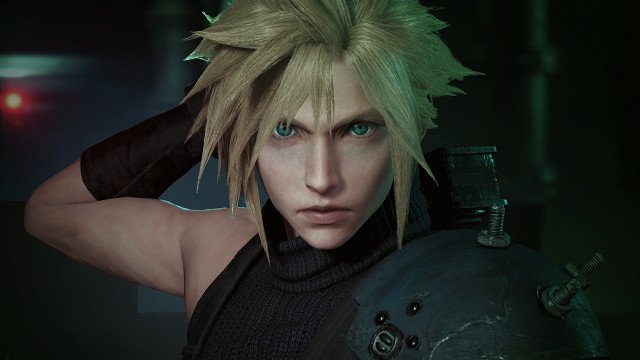
GR: Would you take over the Final Fantasy VII Remake if [Square Enix] offered that one to you?
Tabata: No.
GR: (Audibly astounded) No, you wouldn’t!?
Tabata: No I wouldn’t.
GR: Can I ask why?
Tabata: It’s something I couldn’t make, myself. That’s about it.
GR: Would that be a lot of pressure?
Tabata: Final Fantasy VII is a special game.
GR: It’s the big one.
Tabata: It’s such a special numbered game that I don’t think I can remake that one. There’s so many fans out there, if I were asked to satisfy all those fans, I don’t think that’s something I could do, 100%. If [Square Enix] asked me to make a new Final Fantasy and take it in a new direction, I’d be happy to accept that one, but if they asked me to remake Final Fantasy VII — to release as if it were a modern game, just released today — no, I don’t think that’s something I can do.
I think the only people who could do that are Mr. (Yoshinori) Kitase and Mr. (Tetsuya) Nomura.
[FFVII is] such a special numbered game that I don’t think I can remake that one.
GR: And you say that even though you did such a good job with Crisis Core?
Tabata: Well that wasn’t VII itself.
GR: A spinoff.
Tabata: Yeah, it wasn’t the main game. Now, if they asked me to do Final Fantasy VII-2, that might be different.
GR: Which brings us back to your new project!
*Laughter in the room*
Tabata: We haven’t got that planned!
Square Enix USA Minder: No, no, no, no, no!
GR: Relax, USA. It’s a joke, it’s a joke!
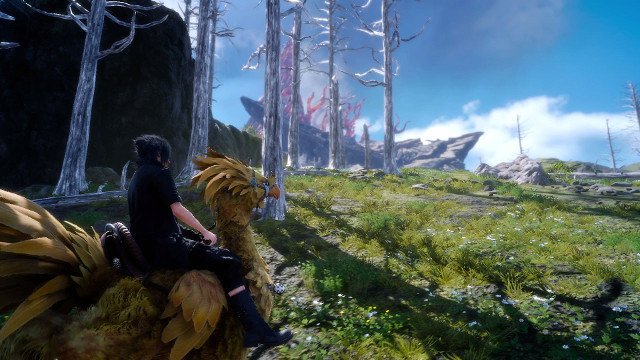
GR: One of the newest updates will “fill in plot holes.” Did anyone notice those plot holes in development, and it was just too late to turn back? At what point did you notice those?
Tabata: While developing the game, up until release, we didn’t have that awareness. It was hard to see (things that required more explanation). What we valued most highly was that core experience of goin gon a journey with your friends. In order to realize that, we wanted to have enough content in there to make it feel right and to feel like that works. We were more worried about, “If that’s the full 100%, how much is that is story, combat, the adventure?”
We put everything we had into it. We put our lives on the line. We were like madmen just trying to complete the game. At that time, we just couldn’t see outside of that, just had to focus on getting the game out. Obviously, after we released the game, we started getting feedback, and then we started to realize maybe some things weren’t as fully explained as they could’ve been.
GR: So user feedback played a part in noticing some of those (plot holes)?
Tabata: User feedback was important, but it was also important for us to take that step back and take a look at what we’d made, as well. To complete a game, you’ve got to make the decision at some point, to say, “No, that’s where we have to stop.” You’re going to face that issue. There’s no team out there that completed a game and didn’t have any regrets — that thinks what they’ve put out is perfect.
Looking back, we see things and think we could’ve, but, no we [had so much going on that we] couldn’t have put them in. You only see after you’ve completed (development of) the game.
Going back and doing that was a really great opportunity and learning experience for us. I’m very glad that we made that decision.
GR: Are simultaneous worldwide releases the normal thing for Final Fantasy, from here on out?
Tabata: For FFXV, I think a global release was essential, yes. Different projects may have a different schedule that works for them, but for XV, it was essential. I also wanted to expand the number of languages available in that one.
GR: Are companion apps also going to become the norm? Are these going to become common for every AAA game? Every Square Enix game? Every Tabata game? Any or all of these categories? Is this the new in-thing?
Tabata: I don’t really think much about companion apps, myself. But think about this: we’re in a generation where a lot of the player base has a device nearby and they can connect to the internet at almost any time.
*Tabata sets his smartphone on the table*
I do work on this phone, I waste time on this phone, I entertain myself, I communicate. It’s the display I look at more than any other. From a game developer’s perspective, you’ve got to be aware of that, and it’d be a strange thing to ignore that.
Even up until recently, five or 10 years ago, if you didn’t know something at work, you’d go and ask someone that information. But recently, no one’s doing that. They can just pick up their phone and find it. The information that you have to ask another human being about is now so limited. You’d be mad to ignore that. These devices have so much power in people’s lives nowadays that ignoring that as a game developer would be a really weird thing.
I think the kids you teach, during their free time, they probably use their phones, right?
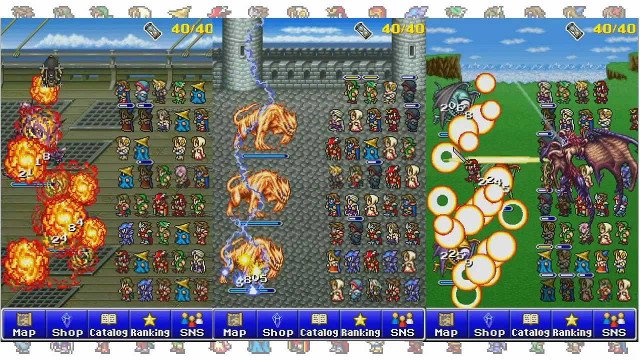
GR: Well, I teach a wide variety of students, so, some have smartphones, yeah.
Tabata: There are lots of people, we’re finding out now, whose first encounter with Final Fantasy was through a smartphone game.
GR: Oh wow, I never thought of that.
Tabata: We did a survey recently about people in their teens, and we asked where they first encountered Final Fantasy, and about 70% of them said it was a smartphone game…
That’s why I think if you just sweep it away and do a companion app and say “Okay, we’ll leave it at that,” that’s not going to work properly, if you don’t make a proper entry to the series that way. That would put a barrier up, to the series in the future, if we didn’t take into account what these people are actually playing games on.
GR: My mind is blown. In that survey, what game was it, that they pointed to?
Tabata: I don’t remember exactly the title, but it was a free download. The sort of thing that’s completely different than what a longtime series fan would’ve said was their first Final Fantasy game.
But then, in that survey, the people who played this game, they didn’t pay any money for it, and practically none of them would go on to play the console games, so I thought that was a really bad thing.
GR: Was it All the Bravest?
Tabata: Which one was All the Bravest?
GR: I’ve never played it, but I know it has a bunch of characters in a straight line and uh….
Square Enix USA: It’s like a tactics-style game.
Tabata: [The survey participants] didn’t always say the name of the game, they’d just say, “Oh it was a smartphone game.”
GR: I find this fascinating.
Tabata: That’s where we’re at now, demographically. Final Fantasy has traditionally attracted [players] mostly in ages up through their 30s and 40s, but with Final Fantasy XV, we’ve taken that down. The majority of our audience is like in the early 20s. That’s not an easy ting to do. It’s really hard to expand the age range and demographic of a series.
In order to do that, you can’t just look at things from your own subjective perspective, you have to go out and see how things are, on the ground. Then you’ve got to create information that appeals to those people and gets to them, in the media that they watch and that they do. It wasn’t an easy thing to do. It was a hard, hard thing.
GR: Yeah….
Tabata: But sorry, you asked me simply if there’d be more companion apps! Yeah, I think they’re pretty good things to do. If they bring one more fan to the series, I think it’s something [a developer] ought to do.
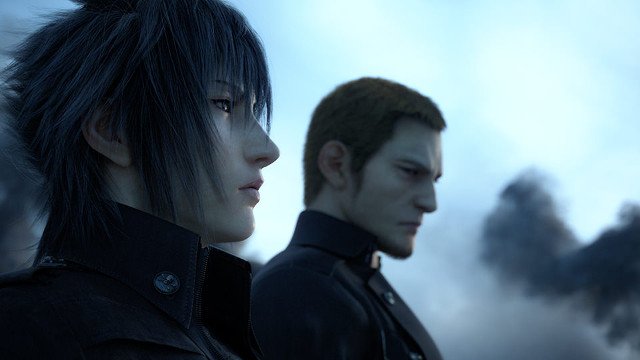
GR: So as you were saying before, nobody “forgets” anything (in the traditional sense) anymore because they’ve got their phones on them all the time, that’s about where I’ll wind down by asking if you think we’re becoming robots.
Tabata: *Laughs* The environment we’re in now is different than it used to be, so the way we communicate has to change too.
GR: Studies have shown that our short-term memories are getting poorer because we don’t have to remember as much.
Tabata: Obviously it’s a natural progression and things are gonna change. What becomes important in learning is going to change because of that. Rather than just memorizing static information, [the brain is] having to think and adapt. Your full process to think is now the much more important thing.
I’ve got a feeling, rather than becoming robots, we’re going to have to become more creative thinkers to get by now.
GR: Well I hope we can, if we’re gonna fight the robots off.
Tabata: You wanna fight the robots?
GR: If they try to fight me first.
Tabata: From a game development perspective too, there are so many processes that can be left to A.I. I don’t think this is gonna have negative effects or make things close up possibilities of what you can make. I think it opens up a lot as well. That’s going to have benefits for the end user as well.
We’re going to be putting a lot of A.I. into the development process of the new project as well. That makes things a lot more efficient. We can develop a lot more efficiently. It’s better than having to look up everything on your phone!
GR: *Laughs*
Tabata: It speeds things up and makes things more precise and effecient.
GR: Which is the whole point of the human subconscious: to automate things and make them easier.
Tabata: That emotional thing is what humanity is all about.
GR: And that seems like a good place to wrap up.
